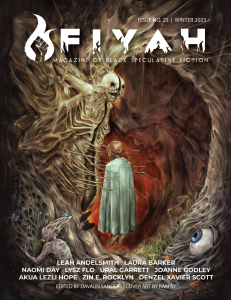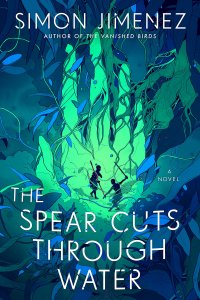Charles Payseur Reviews Short Fiction: Fiyah, Kaleidotrope, and GigaNotoSaurus
 Fiyah Winter ’23
Fiyah Winter ’23
Kaleidotrope 1/23
GigaNotoSaurus 11/22
Opening its sixth year of publication, Fiyah’s January issue carries no official theme but does return again and again to ideas of cultural inertia, trauma, and the need to break toxic cycles to reach for healing. In “A Small Bloody Gift” by Naomi Day, Kehaka is next in line to be a Keeper, someone who makes the soil live again after some unnamed calamity. But the way she’ll do that is by hosting special bees inside her body that will feed on her again and again, as they have fed on her grandmother before her. The prospect terrifies Kehaka, but perhaps not as much as going against the strictly enforced traditions of her family and culture. When she meets someone more ready to look at alternatives that don’t carry so visceral a cost, Kehaka must decide if she will defy expectations or not – and with her grandmother’s health failing, she might not have too long to make the decision. Day unsettles with vivid prose and a grim and oppressive atmosphere that shows the damage done when people stop questioning traditions that rely on pain and sacrifice. Moving to the issue’s poetry, “Recounting the Cat-Child’s Birth to the Elders” by Joanne Godley shows how people are born with a history inside them – and when that history is full of pain and horror, it shapes them. These births become a new layer on old pain, a link of inheritance that is too often added to through new tragedies and injustices. Yet there is also a well of power and learning, and the cat-child from the title is not bent under the weight of the past but strengthened by it, fed on hope and better able to protect herself. It’s a fascinating and moving poem.
Kaleidotrope’s January issue contains a dozen new stories and eight new poems (including one by me, for full disclosure). Among them, “The Answer of the Fickle Heart” by Eden Frenkel is a rather delightful story about Sophie, who is always told she has a fickle heart, not able to settle down, and who seeks out a witch to have it removed. Instead of an operation, though, she’s given a quest to complete – to steal the heart of a woeful dragon – before her wish will be granted. The confrontation between Sophie and the dragon is a series of misadventures, which leads both toward better understanding of who they are and what they want. Frenkel provides plenty of humor and action while carefully carving out a space for fickle hearts everywhere to be recognized, appreciated, and cherished. In “Crawling Back to You” by H. Pueyo, R has been put in a desperate financial situation and joined a reality show based on The Most Dangerous Game. If he survives a week, he wins. Meanwhile the hunter has to kill three out of four prey in a month to win. Oh, and all of them have had most of their memories erased except for the rules of the game, just to keep things interesting. Pueyo crafts a visceral and bloody tale, but one touched by tenderness and longing as well, as R and his hunter realize that they might be connected in an intimate but forgotten way, both feeling out the brutality and thrill of their situation as they try to cope and survive. And it makes for a captivating read.
Moving to the issue’s poetry and “How a Xenomorph Knows” by Annika Barranti Klein finds the narrator and her girlfriend on lesbian day of visibility having a picnic on the moon with the alien queen from Aliens. There’s a magic and a kind of whimsy to the piece that complicates the inclusion of the alien horror and the complex links between visibility, danger, and identity. Klein provides an almost nostalgic or innocent energy while still diving into serious and complicated issues, and succeeds in both provoking readers to think and entertaining them at the same time. Chris J. Bahnsen’s “Coyote Wisdom” follows a narrator looking for change and going out into the desert where they find a coyote who brings them into the sky, into the stars, into a place where things are new and magical and alive. The narrator possesses and is almost possessed by a deep yearning that brings them to a place where they could be destroyed, but also where they can find something to answer the need inside them. Bahnsen explores a kind of celestial recognition and resonance in this fun and freeing poem.
January’s GigaNotoSaurus story is Owen Leddy’s “Old Seeds”, in which Ren has sold xemself to an AI-controlled syndicate in order to give xer children a better life. In a galaxy where humanity is being slowly phased out by the controlling AI, it seemed the only option, and now xe’s the human tiebreaker on a terraforming mission to get a habitable planet to grow lucrative cash crops. Taken out of stasis only when needed, Ren still manages to upset the mission and awaken someone on the world that was supposed to be suppressed. Leddy explores the ways that many humans value life and diversity over sterile monotony, and find ways to rebel against systems designed only for the most efficient and brutal exploitation. While there’s a general sense of hopeless inevitability to the worldbuilding, the story manages to capture a spark of hope and joy that refuses to be crushed and, like a seed, can still be planted to grow into something new and wonderful.
Recommended Stories
“A Small Bloody Gift”, Naomi Day (Fiyah Winter ’23)
“Crawling Back to You”, H. Pueyo (Kaleidotrope 1/23)
Charles Payseur is an avid reader, writer, and reviewer of speculative fiction. His works have appeared in The Best American Science Fiction and Fantasy, Lightspeed Magazine, and Beneath Ceaseless Skies, among others, and many are included in his debut collection, The Burning Day and Other Strange Stories (Lethe Press 2021). He is the series editor of We’re Here: The Best Queer Speculative Fiction (Neon Hemlock Press) and a multiple-time Hugo and Ignyte Award finalist for his work at Quick Sip Reviews. When not drunkenly discussing Goosebumps, X-Men comic books, and his cats on his Patreon (/quicksipreviews) and Twitter (@ClowderofTwo), he can probably found raising a beer with his husband, Matt, in their home in Eau Claire, Wisconsin.
This review and more like it in the March 2023 issue of Locus.
 While you are here, please take a moment to support Locus with a one-time or recurring donation. We rely on reader donations to keep the magazine and site going, and would like to keep the site paywall free, but WE NEED YOUR FINANCIAL SUPPORT to continue quality coverage of the science fiction and fantasy field.
While you are here, please take a moment to support Locus with a one-time or recurring donation. We rely on reader donations to keep the magazine and site going, and would like to keep the site paywall free, but WE NEED YOUR FINANCIAL SUPPORT to continue quality coverage of the science fiction and fantasy field.
©Locus Magazine. Copyrighted material may not be republished without permission of LSFF.






